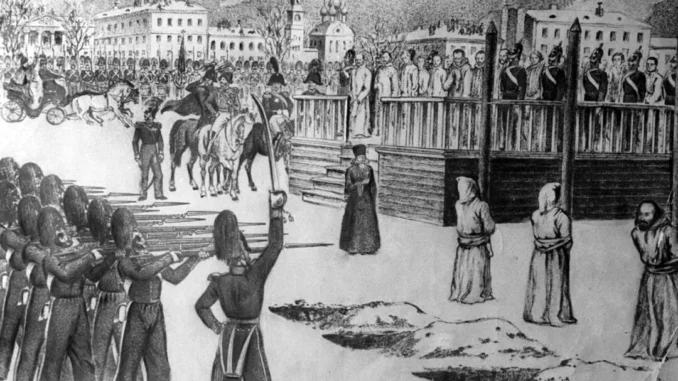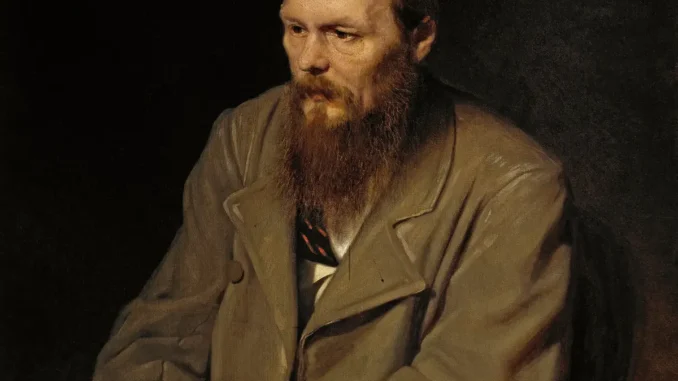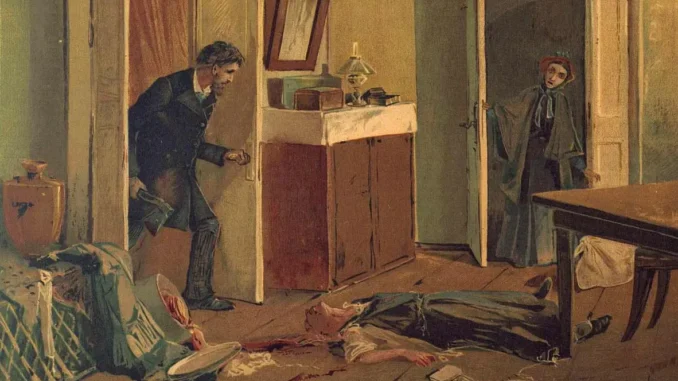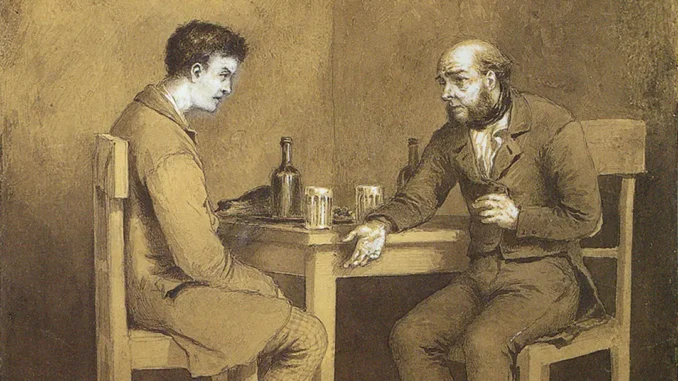The great Russian writer affirmed both the gift of life and the criminal error of socialism in his 1866 novel “Crime and Punishment.”
>By Walker Larson, EPOCH TIMES

“Semionov-platz Mock Execution Ritual,” by B. Pokrovsky (1849). (Public Domain)
The firing squad leveled their weapons at the prisoners, who stood motionless, as though frozen, like the crystallized Russian winter landscape. Moments before, the prisoners had been made to put on the white shirts of condemned men, and told to kiss the Cross. Then they were tied to a pillar in the Semyonov drill ground, three at a time.
It was the end. What thoughts must have flashed through the prisoners’ minds in that all-consuming moment? One of the men, Fyodor Dostoevsky, in a letter to his brother, gives us a glimpse into the workings of his mind when, as he believed, his life was about to slip away.
“No more than a minute was left me to live. I remembered you, brother, and all yours; during the last minute you, you alone, were in my mind, only then I realized how I love you, dear brother mine!”
But just before Dostoevsky was led to the pillar, the guards announced that his Imperial Majesty, Tsar Nicholas I, had granted them a pardon, sparing their lives. It was, perhaps, a cruel kind of joke, a punishment in itself, to warn these men to reform the lives that they’d almost lost. The prisoners were sentenced to four years of exile in Siberia instead of the death penalty. Dostoevsky took the warning to heart, for his life and his beliefs did change, unalterably, after this experience. We see in Dostoevsky’s letter to his brother that the change had already begun, as he writes, “There has never yet been working in me such a healthy abundance of spiritual life as now.”
His affirmation of the gift of life—now brought home to him with astonishing clarity and force after his near loss of it—glows with almost visionary inspiration:

Dostoevsky was, indeed, in need of a “new form.” The reason Dostoevsky found himself nearly executed and then banished to the hinterlands was because of his involvement with the Petrashevsky Circle—a club of intellectuals who discussed utopian socialism—and a secret revolutionary and terrorist group embedded within the former, dedicated to bringing about this “utopia,” even through violent means.
Russia was ripe for radical politics in Dostoevsky’s day, and, like many young men then, he was drawn into the intoxication of new, “progressive” ideas, most notably, socialism. It was these ideas that Dostoevsky began to shake off like dead leaves from a tree during his time in Siberia.
That day, when Dostoevsky stared down the barrel of an executioner’s gun into the reality of death, haunts his fiction, including the 1866 novel “Crime and Punishment.”

Illustration by Nikolai Karazin, 1893, for the novel “Crime and Punishment” by Fyodor Dostoevsky. (Public Domain)
In the novel, a young student, Raskolnikov, who has adopted progressive and nihilistic ideas, decides to murder an old pawnbroker. On his way to commit the crime, all sorts of seemingly insignificant details grip his attention.
“As he passed the Yusupov garden, he was deeply absorbed in considering the building of great fountains, and of their refreshing effect on the atmosphere in all the squares. … Then he was interested by the question why in all great towns men are not simply driven by necessity, but in some peculiar way inclined to live in those parts of the town where there are no gardens nor fountains. … ‘So probably men led to execution clutch mentally at every object that meets them on the way,’ flashed through his mind.”

The Fountain,” circa 1775–1778, by Hubert Robert. Oil on canvas. Kimbell Art Museum, Fort Worth, Texas. (Public Domain)
Raskolnikov’s observation about the psychology of a condemned man is no doubt a reflection of Dostoevsky’s own experience. It may seem paradoxical that a man about to be murdered (or about to commit murder) could think of anything other than that fact, and yet it isn’t so hard to imagine that with seconds left to live, everything becomes important, everything noteworthy. The mind latches on to what it can, refusing to acknowledge the great reality about to occur. Or, the mind is suddenly given a deeper sight into the importance of everything when it’s slipping away.
Dostoevsky’s experiences as a young man inform and shape “Crime and Punishment” in even more profound ways than just this incidental reference. Because of the crucible of his mock execution and subsequent Siberian exile, Dostoevsky went from a man willing to commit violence to bring about a socialist utopia to a man utterly opposed to socialism. He attacks socialist ideas in multiple ways throughout “Crime and Punishment,” written some 15 years after his return from Siberia. In many ways, the novel is a philosophical battle between new philosophies—such as nihilism, socialism, and utilitarianism—and the old view of the world founded upon a Christian ethic and a desire to preserve tradition.

A major theme of the novel is redemption through suffering. An illustration of Raskolnikov and Marmeladov (the alcoholic ex-clerk who weeps in despair for the misery that he causes), 1874, by Mikhail Petrovich Klodt. (Public Domain)
One of Dostoevsky’s most striking and eloquent rebuttals of the socialist error comes from a friend of Raskolnikov’s, the boisterous, brash, but good-hearted Razumikhin, whose name, incidentally, means “reason” or “intelligence.” It’s worth quoting at length:
“You know [the socialists’] doctrine; crime is a protest against the abnormality of the social organisation and nothing more, and nothing more; no other causes admitted! … Everything with them is ‘the influence of environment,’ and nothing else. Their favourite phrase! From which it follows that, if society is normally organised, all crime will cease at once, since there will be nothing to protest against and all men will become righteous in one instant.
“Human nature is not taken into account, it is excluded, it’s not supposed to exist! They don’t recognise that humanity, developing by a historical living process, will become at last a normal society, but they believe that a social system that has come out of some mathematical brain is going to organise all humanity at once and make it just and sinless in an instant, quicker than any living process!
“And it comes in the end to their reducing everything to the building of walls and the planning of rooms and passages in a phalanstery [a building designed to allow a self-contained utopian community]! The phalanstery is ready, indeed, but your human nature is not ready for the phalanstery.”
Razumikhin summarizes, then demolishes the central socialist principle: that human beings are, in the end, mere material machines that can be programmed to behave in an orderly and prosperous way using the right system and proper environmental influences. For a socialist, the root of problems in our world can be reduced to an unjust social system. Fix the system, and you will fix the problems. That system, by the way, requires the demolition of the old structure of society which is, of course, inherently unjust and oppressive. With the old ways gone, and the new scientific social systems in place, human life will become happy, just, and prosperous.
Are human actions the result of environment or choice? Does injustice arise from scientific error or sin? Does it come down to the system or the soul? Like all great literature, “Crime and Punishment” grapples with such fundamental questions.
Through the course of this tense psychological drama and spiritual epic, we see Raskolnikov encounter forces that can’t be accounted for in the materialist socialist explanation of the universe, forces that no system or ideology can control: guilt, regret, self-sacrifice, judgment, forgiveness, and love. It isn’t that someone convinces him, intellectually, of the reality of such things—they’re simply there, in all their mysterious glory. “Life had stepped into the place of theory,” Dostoevsky writes.
When you finish “Crime and Punishment,” you know in the deepest part of your being that humans aren’t machines, that the soul exists, and, therefore, along with it, so does free choice, culpability, and the possibility of both real sorrow and real joy—a joy that no mere “system” could artificially create.



Honeybee
You’re hired.
@ketzel2
My comment: Important thinker. The world would have peace – albeit in a Zen sort of way – if his views were taken more to heart, to whit:
@Adam
My comment: Sounds like a drug. That would explain a lot. Damn, we have to seal that border!
@Adam
Ted, please rescue my most recent post from electronic oblivion and post it in this
space. It is difficult to make any sense at all out of my previous post without also reading this “sequel”
(continuation of previous post).friend Dostoevsky. That is how Doestoevsky came to write truly deplorable antisemitic rants in the Russian press. There are few Jewish characters in Dostoevsky’s most famous. The few Jewish characters who appear in these novels are treated fairly. They are not better or worse than the other characters. It is fortunate for us that he bye and large confined his antisemitism tto the newspapers. However, it is a deeply disturbing thought that Doestoevsky, one of the major European authors of the late nineteenth century, might have been partially responsible for Nicholas II’s virulent antisemitism. And his antisemitism and encouragement of pogroms through his membership in the virulent antisemitic organization, the Union of the Russian people that was probably the main reason he was overthrown. It alienated the Russian middle clas, which by and large was disgusted and outraged by the pogroms. And it provided the discontented peasantry and industrial workers with highly educated leaders who could voice their complaints, lead strikes and “workers councils etc.
Again, I am deeply troubled that one of the greatest writers of the 19th century might have shaared some indirect responsibility for the fall of the Russian monarchy and the horrors of Communism that ensued.
We should not forget that Dostoevsky was a virulent antisemite. Fortunately, there are only a few antisemitic passages in Crime and Punishment and his other famous novels. However, his journallism was filled with antisemitic rants, IN his later years he became close to a man nmed Probodinostov., whom the tsar Alexander apointed to be the chief tutor of his son, the future tsar Nicholas .
. Probodinostev , .brainwashed the future tsar to hate Jews.
Since he considered it improper for a senior goveernment offi.for the press directly, he assigned this role to his
Freud said that.
Sebastien ” Sometimes a czar is just a czat” Really?????????
Felix: Sometimes a czar is just a czar.
Seb
I would still like to know why Ted posted this as it simply showed why Czar not good. Which all knew. I’mIt’s rubbish.
Reuters Jan. 2
https://www.jpost.com/christianworld/article-784909
My comment: I’m sure there are good people on both sides.
from “Love and Death” (1975) Woody Allen 😀
(A brilliant sendup of 19th century Russian novels) )
https://youtu.be/BCxCRI2Qv6U?si=u328DgOPZoktxvjZ
I just wonder why use this Walker Lawson on Israpundit and what point is Lawson making. That Czarism was a good thing? And just accept Czarism.